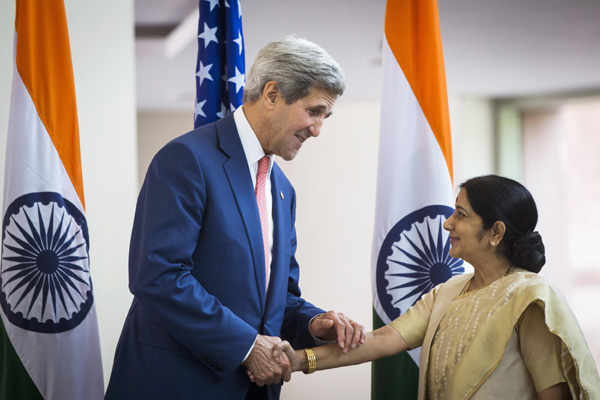 |
|
US Secretary of State John Kerry (L) greets Indian External Affairs Minister Sushma Swaraj in New Delhi July 31, 2014. [Photo/Agencies] |
NEW DELHI - The United States and India stressed their desire to boost business and defense ties on Thursday, but trade and spying rows were a reminder of the obstacles to US President Barack Obama's vision of a "defining" partnership.
After a day of meetings in New Delhi seen as a preparation for a September visit to Washington by new Indian Prime Minister Narendra Modi, US Secretary of State John Kerry said the Indian leader's election had created a "singular opportunity."
"The moment has never been more ripe to deliver on the incredible possibilities in the relationship between our two nations," he told a news conference after the annual Strategic Dialogue meeting between the two countries.
"The United States and India can and should be indispensable partners in the 21st century," he said.
His Indian counterpart, Sushma Swaraj, said the two countries were at "an important turning point" and said they shared "converging long-term strategic interests."
She told the news conference that India was keen to see greater US business participation in its economy and expanded defence cooperation.
Kerry said delivering on the potential was key and much needed to be done to deliver concrete progress by Modi's visit.
He stressed the need to break down barriers to trade, subsidies and protectionism, which US firms have long cited as obstacles in India.
He hailed Modi's commitment to economic reform, but added: "We are waiting to see - the proof is always in the pudding."
The comments show lingering frustrations in a relationship that, while it has come a long way since the suspicions of the Cold War, has yet to live up to Obama's 2010 rhetorical billing as "one of the defining partnerships of the 21st century."
The talks in Delhi were overshadowed by a dispute over India's opposition to a world trade pact and a new expression of Indian irritation over US surveillance activity.
Kerry urged India to reconsider its threat to veto the landmark pact agreed last year in Bali, which aims to speed trade by standardising customs rules and slashing red tape.
